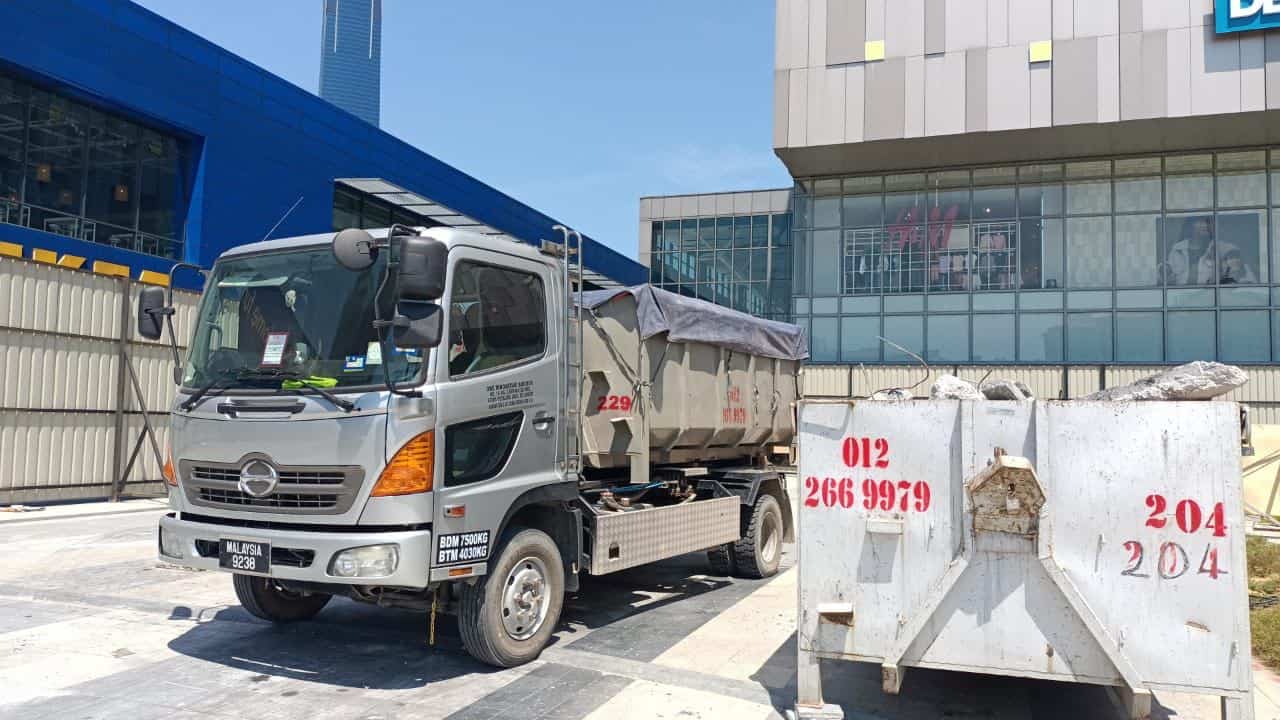RORO BIN RENTAL
Find The Right Size For Your Project

Small Roro Bin
Dimensions: 12′ (L) X 6′ (W) X 2.5′ (H)
Best Use: Heavy construction and demolition waste like concrete and soil.

Large Roro Bin
Dimensions: 12′ (L) X 6′ (W) X 4′ (H)
Best Use: Light-weight construction, industrial, commercial waste, furniture, household bulky waste, trees and etc.

Domestic Roro Bin
Dimensions: 12′ (L) X 6′ (W) X 4′ (H) with roof
Best Use: Domestic food waste (Organic waste).

Extra Giant Roro Bin
Dimensions: 16′ (L) X 8′ (W) X 6′ (H)
Best Use: Light-weight construction, industrial, commercial waste, furniture, household bulky waste, trees and etc.

Giant Roro Bin
Dimensions: 14′ (L) X 7′ (W) X 5.5′ (H)
Best Use: Light-weight construction, industrial, commercial waste, furniture, household bulky waste, trees and etc.
WHAT MAKES US DIFFERENT ?

Value Price

Express Service

Licensed Under Local Authorities

Quick Scheduling
TESTIMONIALS
OUR CLIENTS







PROJECT REFERENCE









Waste Management Corporation
Introduction to Waste Management Corporation
Waste management is a cornerstone of modern society, crucial for keeping our environments clean, safe, and sustainable. But waste management isn’t just about collecting trash—it’s about transforming waste into resources and creating a sustainable, greener planet. Waste management corporations are at the heart of this endeavor, developing comprehensive solutions to deal with waste efficiently. So, what makes waste management corporations so vital, and how do they contribute to our lives?
Why Waste Management is Essential in Modern Society
In today’s world, waste management goes far beyond simple trash disposal. Every year, millions of tons of waste are generated worldwide. Without a proper waste management system, we’d be living in landfills rather than neighborhoods. Effective waste management not only keeps our cities cleaner and safer but also plays a crucial role in minimizing pollution and conserving valuable resources.
The Role of Corporations in Waste Management Solutions
Corporations in the waste management industry serve as the backbone of environmental sustainability, using cutting-edge technology, innovative strategies, and public partnerships to manage waste. They ensure waste is not just dumped but treated as a valuable resource that can be transformed and repurposed, leading to economic and environmental benefits.
The Core Mission and Vision of Waste Management Corporations
A waste management corporation’s mission often revolves around sustainability. They strive to reduce waste, protect natural resources, and support community engagement through various initiatives.
Sustainability and Environmental Goals
The primary goal of most waste management corporations is to minimize the environmental impact of waste. Many corporations adopt zero-waste targets, aiming to eliminate waste production by diverting most of it from landfills through recycling, composting, and other sustainable practices.
Community Engagement and Public Awareness
An essential part of a waste management corporation’s role is educating the community. Through workshops, social campaigns, and school programs, they teach the importance of proper waste disposal and recycling, helping communities become more environmentally conscious.
Key Services Offered by Waste Management Corporations
Waste management corporations provide a wide range of services tailored to different waste-producing sectors. Here’s a breakdown of the major services they offer.
Residential Waste Collection
For most households, waste management starts with regular waste collection services. These services include the disposal of household waste and specialized recycling services.
Household Waste Disposal
Residential waste disposal services ensure that household trash is collected and processed in an environmentally safe manner, with minimal disruption to residents’ lives.
Recycling Services for Homes
Recycling services focus on collecting and processing recyclable materials, like paper, plastic, and glass, helping reduce the volume of waste sent to landfills.
Commercial Waste Solutions
Businesses generate a large volume of waste, requiring specialized waste management strategies.
Tailored Services for Businesses
From small businesses to large corporations, waste management companies offer tailored solutions that meet specific industry requirements, ensuring that commercial waste is handled efficiently and sustainably.
Specialized Waste Solutions
Commercial services may include specialized waste management, such as handling construction debris or medical waste, which requires compliance with strict safety and environmental standards.
Industrial Waste Management
Industrial waste management is one of the most challenging aspects, as it often involves hazardous materials.
Handling Hazardous and Non-Hazardous Waste
Industries produce hazardous and non-hazardous waste that must be handled with the utmost care to protect public health and the environment.
Adherence to Safety and Environmental Standards
Industrial waste management follows rigorous standards, ensuring that hazardous materials are disposed of safely and without harming ecosystems.
Advanced Waste Management Technologies
Waste management has advanced far beyond traditional methods, thanks to technology. Innovations like AI, automation, and recycling technology have revolutionized the industry.
The Role of AI and Automation
AI helps optimize collection routes, automate sorting processes, and improve recycling efficiency, while automation speeds up processes and reduces labor costs.
Recycling Innovations and Green Tech
New recycling technologies, like chemical recycling and biodegradable materials, offer better ways to handle waste and reduce environmental impact.
Sustainable Practices and Environmental Impact
Sustainability is the ultimate goal in waste management. Corporations are working hard to reduce their carbon footprint and contribute to a cleaner planet.
Reducing Carbon Footprint in Waste Management
Waste management corporations are increasingly adopting practices that reduce emissions, from using electric collection vehicles to implementing energy-efficient recycling processes.
Embracing Zero-Waste Goals
The zero-waste movement is central to sustainable waste management, with corporations aiming to recycle or repurpose as much waste as possible rather than sending it to landfills.
Waste-to-Energy Initiatives
Some waste management corporations are turning to waste-to-energy methods, where waste is converted into electricity, heat, or fuel.
Converting Waste into Renewable Energy
Waste-to-energy plants process waste that can’t be recycled and transform it into clean energy, which can power homes, businesses, and industries.
Benefits for Local Communities and the Environment
This approach reduces waste in landfills and provides a renewable energy source, benefiting local communities and contributing to a healthier environment.
Regulations and Compliance in Waste Management
Waste management corporations operate under strict regulations to ensure environmental safety and sustainability.
Understanding Local and Federal Regulations
Corporations must comply with a range of local, federal, and international regulations that dictate how waste should be collected, processed, and disposed of.
Importance of Compliance for Environmental Safety
Compliance with these regulations protects the environment and prevents harmful pollutants from affecting air, water, and soil quality.
Corporate Social Responsibility in Waste Management
CSR plays a big role in waste management, as corporations work to promote environmental sustainability.
Promoting Sustainable Practices among Partners
Many corporations work closely with their partners and suppliers, encouraging them to adopt sustainable practices and reduce waste.
Educating the Public and Raising Awareness
Corporations invest in campaigns that educate the public about responsible waste disposal and recycling, aiming to inspire sustainable habits in communities.
Challenges Faced by Waste Management Corporations
Waste management is a complex field with numerous challenges, from handling hazardous waste to public health concerns.
Managing Hazardous Waste
Hazardous waste requires careful handling and disposal, which can be costly and labor-intensive.
Addressing Public Concerns and Health Risks
Waste management corporations must address public concerns around waste disposal sites, pollution, and health risks associated with improper waste handling.
The Economic Impact of Waste Management Corporations
Beyond environmental benefits, waste management corporations significantly contribute to the economy.
Job Creation and Economic Benefits
These corporations provide numerous job opportunities in various fields, from collection to recycling to waste-to-energy.
Costs vs. Benefits of Effective Waste Management
Although waste management requires a substantial investment, the economic and environmental benefits make it a worthwhile endeavor.
How Consumers Can Support Waste Management Efforts
Waste management is a collective effort, and consumers play a crucial role in reducing waste.
Practicing Responsible Waste Disposal
Simple practices like sorting recyclables and disposing of hazardous materials responsibly help reduce waste.
Reducing, Reusing, and Recycling
Embracing the 3Rs—reduce, reuse, recycle—can go a long way in minimizing waste and supporting waste management efforts.
Future Trends in Waste Management
The future of waste management looks promising with innovations and an increased focus on sustainability.
The Rise of Smart Waste Solutions
Smart waste solutions, like IoT-based bins and AI-enabled sorting systems, will make waste management more efficient.
Increased Focus on Circular Economy
The circular economy aims to keep resources in use for as long as possible, with waste management corporations playing a vital role in recycling and repurposing materials.
Waste Management Corporations – A Path to a Cleaner Future
Waste management corporations are the unsung heroes of environmental sustainability. Through innovative technologies, sustainable practices, and a strong commitment to community engagement, they’re leading the charge toward a greener future. By supporting these corporations and embracing responsible waste practices, we can all contribute to a cleaner, healthier planet.


